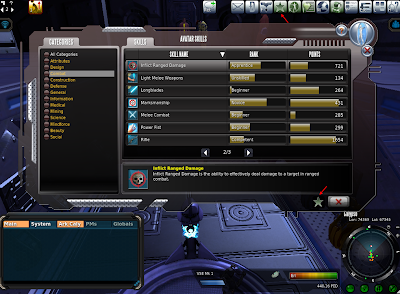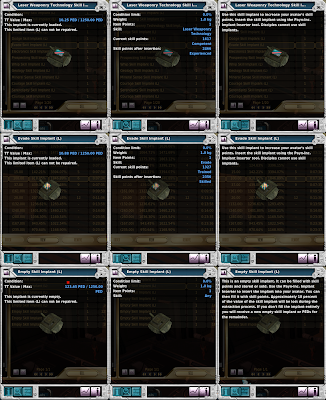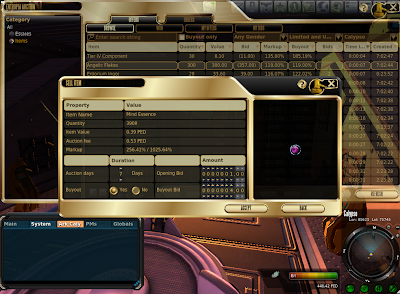Skill Points And Profession Levels
And as far as these are concerned, whenever you do something within the game like hunt, mine, craft or even sweat, you will often start to see some sort of green "skill lines" appearing. Stuff like "[System]: You have gained Alertness." or "[System]: You have gained experience in your Dodge skill."
These skill lines (whenever they do appear) indicate to you that you have gained a tiny amount of skill points in the said skills (Alertness or Dodge in this case). And whenever you've gained enough to fill up the bar of that skill, you will gain 1 skill point in it. Simple as that.
However, that's only the tiny picture.
In the overall scheme of things, these skills and skill points are only important in the fact that they somehow contribute to your profession levels. And that your profession levels are the only "true" ones that are important in determining your "skills or aptness" in using or when doing something.
For instance, let us look at "Alertness". According to Entropedia, the amount of skill points that you have in Alertness affects your "Dodger" (5% effect), "Evader" (5% effect), "Jammer" (5% effect) and "Pet Handler" (3% effect) professions.
So what this means, I believe, is that the more Alertness that you have, the higher your profession levels will be in the "Dodger", "Evader", "Jammer" and "Pet Handler" professions. However, the Alertness' effect on those professions will of course be scaled accordingly (as per indicated).
And correspondingly, the higher your profession level is, the better you will be in performing the task at hand (that is related to that profession). For example, the "Evader" profession determines how well you can avoid enemy melee attacks. Hence, the higher your "Evader" profession level, the better you can avoid those melee attacks that are coming at you.
Chipping In And Chipping Out
But effectively, the only good thing in knowing about the relationship between all these skills, skill points and profession levels...is that it becomes particularly useful when you wish to start chipping in and chipping out your skills.
For instance, let us say that you have a laser pistol which requires your "Ranged Laser (Dmg)" to be at profession level 15 to max...but your only at around level 8. So in order to try and raise it to level 15 (to use the gun), you've decided that you will chip in certain skills to make it so.
And so the question is, which skills do you chip in?Naturally, when we consult Entropedia on the "Ranged Laser (Dmg)" profession, we find the above skill relations.
And ideally, if cost is not a factor (as in you have unlimited PEDs), then you would want to chip in skills which will have the most pronounced effect on the profession.
In other words, basically skills such as "Laser Weaponry Technology" (25% effect) and "Anatomy" (20% effect) would be your primary choices for chipping in.However, in reality, not only is PEDs a real cost of concern, but so is the amount of skill points that you presently have in the skills a huge factor to consider as well.
The more skill points that you have in a certain skill, the harder (and more costly) it becomes for you to raise it by a further point.Hence, tools such as "Entropia Universe Chipping Optimizer" becomes very important to us.
If I had just blindly chipped in ONLY "Laser Weaponry Technology" in order to force my "Ranged Laser (Dmg)" profession to level 15, I would have suffered a whooping loss of 609 PEDs at least. However, if I had followed and used the above chipping optimizer, I would have only needed about 363 PEDs instead.
Skill Implants and Empty Skill Implants
So how do we chip in and chip out our skills?Well, as far as I know, we will need a Payn-Inc Implant Inserter (the one used to insert Mindforce Implants) and the above...a Skill Implant (to chip in skills) or an Empty Skill Implant (to chip out skills).
To chip in, just attach the skill implant onto the Payn-Inc Implant Inserter, equip the inserter and operate it. This will increase the corresponding skill by the amount of skill points as shown on the skill implant's item info. To chip out, you will just need to do the same, but with an empty skill implant instead.
Do note that the "TT Value" of the chip (roughly) represents how much skill points it is currently storing (for skill implants) or can store (for empty skill implants).
Furthermore, when chipping out skills, if the amount of skill points that you are extracting does not require the entire empty skill implant's TT Value, then you will usually get back another empty skill implant in return.
However, that is only in the case that the resultant empty skill implant's TT Value will be above 10 PEDs still. Else, you will only be getting back the leftover TT Value in PEDs (and lose whatever potential markup that the empty skill implant would have had).
And because of this, it is often better to make sure that your making use of the entire empty skill implant (when chipping out skills)...especially if its TT Value is close to 10 PEDs.
Auction and Markup
For this part, there isn't much to talk about because most of the "difficult" markup concepts are already previously explained. As such, this part is mainly acting as a filler to talk about the fees involved with the auctioning of stuff.
Auctioning Your Wares
The following shows a classic case of when your selling an item via auction.
- Item Name
This tells you the name of the item that your selling.
However, do note that not all items are allowed to be placed on auction for sale. Some items are simply "blocked" by the system and can never be placed on auction. (Don't ask me why...it just IS the way it is.)
- Quantity
This tells you the quantity of the item that your selling.
Do note that the quantity that is shown here will be sold "as is" (as an entire bulk)...and at the price that you've set. You do not get to sell stuff "in singles" unless you've placed them as singles (or that they are inherently non-stackables).
- Item Value
This tells you the Total TT Value of the item that your selling.
- Auction Fee
This tells you the amount of PEDs that will be charged for placing your item on auction.
For Regular Items And Stackables:
It is calculated using the eventual markup (Final Sale Price - Item Value) at which the item gets sold at. Hence, the higher your eventual markup, the more auction fee you will get charged with.
Auction Fee = 0.5 + ((74.625 * Markup) / (1492.5 + Markup))
For Estates And Deeds:
Auction Fee = 0.5 + ((9.95 * Markup) / (199 + Markup))
- Markup
This tells you the markup at which your selling the item at.
It can be shown as a percentage or it can be shown as TT + Markup. But regardless of how it is shown as here, the auction fee will still be calculated as stated above.
- Auction Days
This tells you the number of days that your placing the item on auction. It can be between a minimum value of 1 real life day and up to a maximum of 7 days.
As this does not come with any extra "charges", most people would opt to put the item up for the maximum number of days possible.
- Opening Bid
This tells you the "Opening" or "Starting" bid at which your selling the item at.
As this is directly tied into the auction fee at which you will be charged with "initially" (when placing the item on auction), most people would usually put this at a value such that if the item does only get sold at the "Opening Bid", it will still at least cover back the markup value of the item itself as well as any auction fee that is involved.
Pricing this "Opening Bid" too high is ill-advised as this "initial" auction fee will be charged...regardless of whether the item gets sold or not (and is usually borne by the seller of the item). - Buyout
This offers you the option of putting a "Buyout Bid" for your item.
If none is offered, the item will only be sold at the very end of the auction...depending on how many auction days that you've set and whether anyone has placed a bid on your auction.
- Buyout Bid
This tells you the "Buyout" bid that you've placed for your item.
Any potential buyer whom wishes to immediately obtain the item that your selling can just offer to pay the "Buyout Bid" that your asking.
Buying Stuff Via Auction
There are two ways to buy stuff via auction. One is to do it manually and search through the auctioned stuff for what you want. The other is to buy it automated via "Orders".
- Buying Manually
When buying manually, all you need to do is to search through the entire list of auctioned stuff for what you want, double click on it, put up your bid and wait. Or you can just pay for the buyout bid (if it has any) and get the stuff immediately, if you don't want to wait.
Note that bids can only be placed in increments of 1 PED. It can be more than that, but never lesser than 1 PED. So sad to say, you can't bid in PECs.
If you've managed to win the auction, the item will usually be found under the "Won" tab. You can then just visit the tab, double click on the item to claim it. Stuff that you've placed on auction that does not get sold will also be found in this "Won" tab as well. So do take note of that.
When bidding manually, be especially careful / alert when bidding on items with no "buyouts". There is a very real risk of bidding your ENTIRE PED card (by accident) onto the item.
And as all trades are "final", the chances of getting back the "extra PEDs" that you've bidded by accident...is very slim.
Well, I'ld suggest that you don't ever bid on anything at all (nor sell anything) if your feeling sleepy and have trouble staying awake. - Buying Via Orders
When buying via orders, all you need to do is to go to the "Orders" tab, look under "Available", select the item that you wish to acquire and click on the "Order" button that lights up.
You can then set up the "Markup" at which your willing to buy the item at, the "Quantity" or amount of that item that your willing to buy and the number of "Valid Days" of which the order will be active.
You will then just need to pay up the appropriate "order fee" (which basically consists of a "non-refundable" 1 PED charge for every "Valid Day" that you've chosen to set up) as well as set aside a "Reserved Funds" pool (which is deducted from your PED card in order to pay for the goods that you will be acquiring).
The leftovers in your "Reserved Funds" pool will be automatically refunded back to your PED card upon the expiry of the order that you've created.
Although automated and will still be actively buying for you regardless of whether your online or not, you will need to realize that this "Orders" system is actually pretty "dumb".
First of all, it will only purchase the item that you've ordered...IF AND ONLY IF...the seller has placed a "buyout bid" on the item.
Items with no buyout bids are totally ignored regardless of whether its current bid (and markup) is at or below that which you've set.
Secondly, the order that you've set up will only purchase the item...IF AND ONLY IF...you have sufficient funds to acquire the "entire bulk" of the item that the seller has placed up.
The system is too dumb to allow for partial purchases.
Lastly, the "Orders" system is made in such a way that "HE WHO OFFERS THE MOST (MARKUP) GETS HIS ORDER FILLED FIRST".
And by this, I mean that if both Person A and B has placed an order for a specific item, the one whom has given the better "markup" offer will have first dibs (regardless of the actual buyout price that is being paid).
For instance, Person A has placed an order to buy 2,000 Alicenies Gel at 120% markup while Person B has placed his order to buy 1,000 Alicenies Gel at 130% markup.
Along comes Person C who has some Alicenies Gel to sell...perhaps maybe 1,500 of them.
If this Person C sells just 500 of them and at a buyout of 110% markup, then Person B will be the one who would have bought Person C's auction out (at the buyout price of 110% only, not 130%)...as he is the one "offering the better markup".
If this Person C were to have decided to sell all 1,500 of them together (in a bulk) and still at the buyout price of 110%, then Person A would have been the one to get the auction instead...as he's the one who has enough "reserved funds" to buy the auction out (even though Person B had first claim to it).
If instead this Person C were to have just sold 1,000 of them and at a "Starting bid" of 105%...but no buyout, then no one would have gotten it (neither Person A nor B) since no buyout was set.
But ideally, if Person C was a veteran, he should have instead tried to maximize the amount of PEDs he could have gotten by splitting his bulk of Alicenies Gel into two. One bulk of 1,000 Alicenies Gel at a buyout of 130% markup (to fill Person B's order) and the leftover 500 Alicenies Gel at a buyout of 120% markup (to fill Person A's order...albeit partially only).
The rest of Person A's order, the remaining 1,500 Alicenies Gel (that was unfulfilled), can just be satisfied by someone else instead of Person C.
| Previous: Entropia Universe (Part Nine) | Next: Entropia Universe (Part Eleven) |
 Friday, October 24, 2014
4:50 PM
Friday, October 24, 2014
4:50 PM
 BuLaDiFu
BuLaDiFu










 Posted in:
Posted in: 

